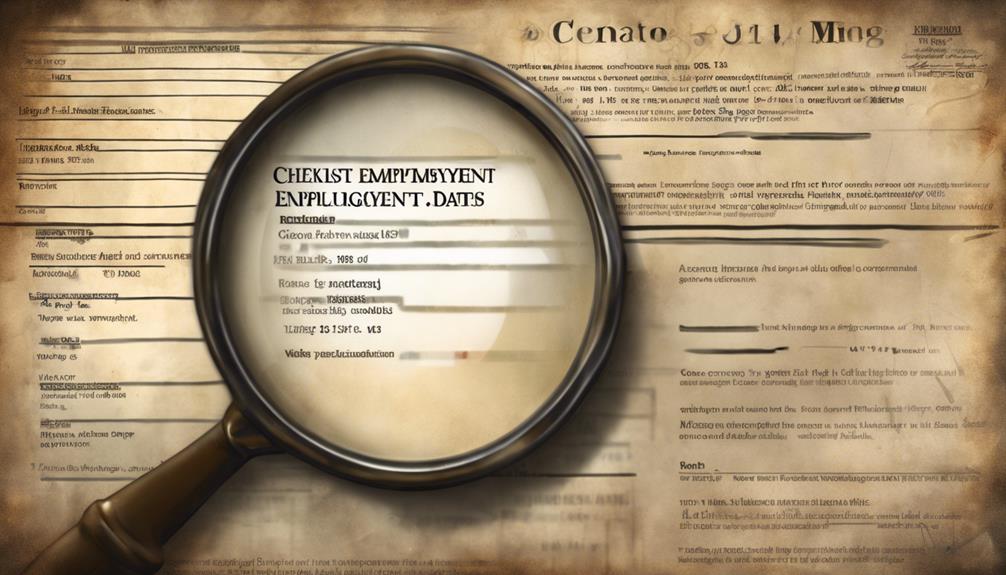Employment background checks in Florida typically go back 7 years for criminal history records, except for specific cases. Adherence to Fair Credit Reporting Act (FCRA) guidelines is vital for accurate reports. Different industries or positions may require longer reviews, influencing hiring decisions. Non-convictions are usually not reported after 7 years. Verification processes guarantee reliable candidate information. Employers can choose between Level 1 and Level 2 checks for varied positions. Utilizing reputable resources aids in gathering accurate background check data. Understanding these limits and requirements is essential for informed decision-making in the hiring process.
Key Takeaways
- Florida background checks typically cover the past 7 years of criminal history records.
- Some industries or positions may require longer look-back periods.
- FCRA guidelines regulate background check information duration.
- Non-convictions are reported for a maximum of 7 years.
- Employers must comply with FCRA regulations for accurate reports.
Overview of Background Check Duration
Background checks for employment in Florida typically cover the past 7 years of an individual's criminal history records. Employers in the state may also consider verifying education, employment history, and professional licenses during the screening process.
The Fair Credit Reporting Act (FCRA) regulates the duration of background check information, ensuring that employers adhere to specific guidelines.
In certain cases, industries or positions may require a longer look-back period beyond the standard 7 years. It's important for employers in Florida to be aware of any exceptions that apply to their specific field to conduct thorough background checks.
FCRA Guidelines in Florida
The Fair Credit Reporting Act (FCRA) guidelines in Florida play a significant role in regulating the duration and types of information included in background check reports for employment purposes. FCRA rules ensure that background check reports are accurate, fair, and follow specific reporting guidelines. In Florida, non-conviction records like arrests can only be reported for up to seven years. Bankruptcies are typically included in reports for up to ten years, while civil suits, judgments, and tax liens older than seven years are usually excluded from background checks. Employers must adhere to these FCRA guidelines to maintain the fairness and precision of the information provided in background check reports.
| Type of Information | Reporting Duration |
|---|---|
| Non-Conviction Records | Up to 7 years |
| Bankruptcies | Up to 10 years |
| Civil Suits | Excluded after 7 years |
| Judgments | Excluded after 7 years |
| Tax Liens | Excluded after 7 years |
Criminal History Records Limitations
Florida's criminal history records for employment background checks typically extend back seven years, aligning with FCRA guidelines.
However, exceptions may exist for certain offenses or positions of trust, allowing for a deeper review of an individual's past.
Understanding the timeframe limitations of background checks in Florida is vital for employers seeking to make well-informed hiring decisions.
Florida's Criminal Record Laws
Criminal history records limitations in Florida restrict the reporting of non-convictions to a maximum of 7 years. This means that arrests without resulting convictions won't appear on background checks after this period.
However, convictions have no time limitation and can be reported regardless of how long ago they occurred. Particularly serious offenses like sex crimes and felonies may not have a time limit on reporting in Florida.
Additionally, bankruptcies can be reported for up to 10 years, while civil judgments and tax liens may have a 7-year reporting limit.
Employers in Florida must adhere to the Fair Credit Reporting Act (FCRA) regulations, which outline specific timeframes for reporting different types of records.
Understanding these reporting limitations is essential for both employers and individuals undergoing background checks to comply with Florida's criminal record laws and the FCRA.
Employment Background Check Limits
Employment background checks in Florida typically extend back seven years for criminal history records. Florida follows the guidelines set by the Fair Credit Reporting Act (FCRA) when conducting these checks.
The FCRA imposes limitations on reporting non-conviction records, civil suits, and judgments that are over seven years old. Employers in Florida must adhere to FCRA regulations to guarantee the scope and depth of background checks are compliant.
Understanding these limitations is essential for both employers and job applicants. By knowing how far back certain information can be reported, individuals can be better prepared when undergoing background checks for employment purposes.
It's important to note that the FCRA aims to strike a balance between providing employers with relevant information and protecting the rights of job applicants. Being aware of these regulations helps create a fair and transparent process for all parties involved in the employment background check process in Florida.
Timeframe for Background Checks
Background checks for criminal history records in the state of Florida typically extend back seven years. This timeframe aligns with the Fair Credit Reporting Act (FCRA) regulations that impose limitations on reporting certain information beyond the 7-year mark. While most background checks adhere to this standard, there are exceptions to take into account.
Specific types of convictions or positions of trust may necessitate a thorough examination of an individual's past, potentially uncovering older records. However, civil judgments, lawsuits, and arrest records that surpass the 7-year threshold are often excluded from the background check report.
Employers conducting employment background checks in Florida must prioritize compliance with FCRA regulations to ensure the accuracy and legality of their screening processes. By understanding the limitations and exceptions surrounding the timeframe for background checks, employers can make informed decisions when evaluating candidates for positions of responsibility and trust.
Education and Employment Verification

Education and employment verification in Florida background checks are vital steps to confirm a candidate's academic and work history. Employers typically request information covering the last 7-10 years to assess qualifications accurately.
This process guarantees that employers have reliable data to make informed hiring decisions.
Verification Process Overview
The verification process for education and employment in Florida background checks guarantees the accuracy of applicants' provided history.
When it comes to verifying employment history, background check providers typically focus on the past 7 years. However, for certain job roles, employers may request verification beyond this standard period to gain a thorough understanding of an applicant's experience.
On the education side, the process centers on confirming degrees obtained from accredited institutions to validate authenticity. Employers rely on this verification process to accurately assess a candidate's qualifications and suitability for a position.
To maintain precision, background check providers adhere to strict guidelines that help confirm the legitimacy of the information provided. By following these procedures meticulously, employers can make informed hiring decisions based on reliable and verified education and employment backgrounds.
Document Requirements Needed
When seeking to confirm education and employment history as part of background checks in Florida, applicants may be required to provide specific documents to support their claims. For employment verification, candidates may need to submit W-2 forms, pay stubs, or other official records that validate their work history. These documents offer employers tangible evidence of a candidate's past employment and salary information, aiding in evaluating their qualifications for the position.
Regarding education verification, individuals may be asked to provide certificates, transcripts, or diplomas to confirm their highest degree achieved. Background checks in Florida typically focus on the last 7 years of a candidate's employment history and the highest level of education completed. The extent of verification can vary depending on the employer's standards and industry practices, ensuring that the information gathered is relevant and recent for making informed hiring decisions.
Employer Requirements for Background Checks

Employers in Florida are required to follow specific guidelines when conducting background checks on potential employees. To guarantee compliance, employers must adhere to the Fair Credit Reporting Act (FCRA) guidelines.
Background checks in Florida typically go back seven years for criminal history records, excluding certain information like civil judgments and old arrest records. Employers may choose between Level 1 and Level 2 background checks based on the position's responsibilities and trust requirements. These checks may include verifying education, employment history, and professional licenses.
When conducting background checks, employers often engage a background check provider to assist in gathering the necessary information. By abiding by these regulations and utilizing reputable resources, employers can make informed hiring decisions while maintaining legal compliance in the state of Florida.
Compliance Measures for Employers

To guarantee compliance with background check regulations in Florida, employers must carefully implement specific measures. Florida background checks require adherence to the Fair Credit Reporting Act (FCRA), which dictates the limitation on reporting criminal information to seven years for non-convictions and ten years for convictions.
Employers in Florida must obtain written consent from applicants before conducting background checks. Providing applicants with clear notices regarding background checks and their rights in the process is essential for meeting the requirements of the law.
Working with reputable background check providers ensures that employers receive accurate and FCRA-compliant reports for employment screenings in Florida. By following these compliance measures, employers can navigate the intricacies of background checks while upholding the legal standards set forth by the FCRA in the state of Florida.
Frequently Asked Questions
How Many Years Can an Employer Go Back on a Background Check in Florida?
An employer in Florida can typically look back 7 years on a background check for non-conviction information. Criminal convictions older than 7 years may not be reported, in accordance with the Fair Credit Reporting Act guidelines.
Does Florida Follow the 7 Year Rule?
Florida does not adhere to the 7-year rule for background checks; employers in the state can assess a candidate's complete criminal history without time limitations. This flexibility enables employers in Florida to evaluate information from any point in a candidate's past.
How Far Back Does a Level 2 Background Check Go in Florida?
Employers seeking in-depth insight into an individual's criminal past commonly utilize Level 2 background checks in Florida. These detailed searches explore an individual's entire criminal history, providing a thorough overview for decision-making.
How Far Do Most Jobs Go Back on Background Checks?
Employers in Florida typically look back 7 years on background checks for most jobs. Factors like job nature and offense severity influence the timeframe. Some industries may require deeper checks beyond the standard period. Compliance with laws guides the process.
Conclusion
To sum up, employment background checks in Florida typically go back seven years for criminal history records, in accordance with FCRA guidelines.
While some may express concern about the limitations of these checks, employers must prioritize compliance and accuracy in their screening processes.
By following legal requirements and conducting thorough verifications, employers can guarantee a safe and trustworthy work environment for all employees.









